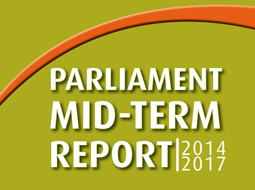
The Presiding Officers of Parliament will be presenting the performance report of the Fifth Parliament tomorrow. Parliament has invited an array of stakeholders to engage them on how far the Fifth Parliament has gone since its inception in 2014, and how much it still needs to do to achieve its ideal of an “Activist Parliament”.
This engagement, which will be addressed by the Speaker of the National Assembly, Ms Baleka Mbete and the Chairperson of the National Council of Provinces, Ms Thandi Modise at Parliament, will be the first of its kind on our country’s legislative calendar. And will generally focus on progress made on Parliament’s six strategic areas that fall within four broad areas: Law-Making and Oversight; International Relations; Public Participation; and Internal Arrangements.
On Law-Making and Oversight, the briefing is expected to give an account of how many pieces of legislation came before Parliament thus far, how many have been processed and passed into law. And how they will contribute in defining the South Africa we want. Or generally, what are the law-making and oversight challenges that have emerged thus far, if any, and how Parliament seeks to overcome them? This presentation will reflect on Parliament’s law-making machinery and its effectiveness thereof.
Most anticipated are the Presiding Officers’ reflections on the legacy project of the Fifth Parliament: The High Level Panel (HLP) on the Assessment of Key Legislation and the Acceleration of Fundamental Change, which comprises experts and headed by our former President, Kgalema Motlanthe, focused on the following themes: Poverty Eradication, Unemployment, Inequality and Equitable Distribution of Wealth, Land Reform and Rural Development. The HLP’s final report is still coming. And there is no parliamentary undertaking that sought to define the shape and form of an “Activist Parliament” than the inception of this panel, whose work could have far-reaching effect on how law-making is done. This report could, in a way, revise how legislation is conceived, processed, passed, evaluated and monitored in future. In that, it could reinvent Parliament’s law-making and oversight machinery to ensure that it induces the transformation agenda enshrined in our Constitution.
On International Relations, the Presiding Officers are expected to provide a feedback on how Parliament monitored the implementation of its International Relations Strategy. And how it provided a framework for cooperation and our country’s engagement in bilateral and multilateral relations with United Nations agencies and other international bodies.
On Internal Arrangements, Parliament is, among other things, expected to brief its stakeholders on what it has done to empower Members of Parliament with household and electronic equipment to undertake their work more effectively. Or what are emerging challenges and demands, if any, in this regard and how it intends to solve them.
This briefing, which will take the form of an open engagement, will open Parliament to public scrutiny. Most significantly, it seeks to give tangible effect to the notion of a people’s Parliament. A Parliament that not only represents the people, but that is also accountable to them.
Practically, this engagement will hold Parliament to account or oblige it to explain itself as to how it functions or how it seeks to uphold its constitutional and legislative mandates to address some of the pressing issues of the day.
On the whole, Parliament will use this engagement to reflect on the idea of an “Activist Parliament” and how its stakeholders can help to influence and shape its course in the future. This seeks to show that the establishment of the Fifth Parliament was not merely an administrative function. It was a critical milestone in deepening and entrenching democracy. As such, it (Parliament) remains accountable to the people and respects what they would like to achieve as a nation.
By Abel Mputing
13 November 2017

